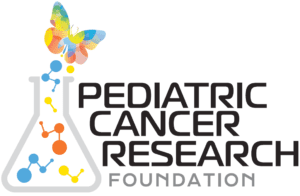By Amanda Saratsis, MD | February 2, 2023
As we immerse ourselves in 2023, our team at the Pediatric Cancer Research Foundation has been reflecting on the state of cancer care for kids and specifically on recent and exciting discoveries that should push the field forward. It is clear to us that science is at an inflection point and is well poised to uncover the types of breakthroughs for pediatric cancer treatment that we all are eager to see. With this energy as our backdrop, we are launching a science blog called Profectus (Latin for advancement) that will feature monthly updates and insights on pediatric cancer research advances. This article, our first, summarizes some of the key trends we anticipate will drive research forward and improve clinical outcomes for children with cancer. These thoughts were assembled with the input of clinicians and researchers across the country who share our commitment to improving care for children fighting cancer.

Treating Children in the Molecular Age
One of the biggest accomplishments in the field of pediatric cancer research to date is the recent increasing molecular understanding of cancer biology and the incorporation of molecularly targeted agents into cancer therapy. Advanced, next-generation molecular analysis of tumor tissue, and sometimes even analysis of “liquid biopsy” specimens such as blood, urine, or cerebrospinal fluid, can now be done affordably and at scale, revealing tumor specific mutations or molecular expression profiles that can be used to select drugs (chemotherapy) that are specific to these characteristics, leading to more effective treatment for cancer. In some cases, children can be monitored over time for response or resistance to therapy (sometimes referred to as response-adaptive therapy), which can improve their chances for a cure. This use of molecular biomarkers for diagnosis, prognosis and theranostics has changed the playing field for cancer treatment, and holds significant promise for improving clinical outcomes for these children.
International Collaborations that Break Down Barriers
Another novel aspect of cancer research that is facilitating discovery is the formation of multiple national and international collaborative enterprises to promote research and clinical trials. Advances in computing power, data analytics, and communication techniques across the globe have facilitated multi-national biobanks, research consortia, and global clinical trials. These groups have pushed the boundaries of what could be achieved by a single researcher alone, and have led to massive amounts of useful data that helps us understand cancer biology and response to novel therapies. As one of our researchers pointed out, “we can only move the needle with partnership.”

Harnessing the Power of the Immune System
Continued progress in immunotherapy approaches (including CAR-T cells and immunologic chemotherapeutics) for fighting cancer continues to push the boundaries of what is possible for cancer treatment by harnessing the power of our own immune system. Immunotherapy and immune cell based therapeutic approaches have been developed for some of the most deadly, recalcitrant forms of pediatric cancer, such as brainstem glioma, with promising results and offering hope to families where none existed only a few short years ago. As the research community continues to test and develop this strategy, clinicians and scientists are hopeful that real change in clinical outcomes can be achieved with this approach.
Thank you for your continued interest and support. We look forward to forging new paths and pushing the boundaries of scientific discovery together!
Amanda Saratsis, MD
Board Member, Scientific Affairs
Jeri Wilson
Executive Director, CSPG





